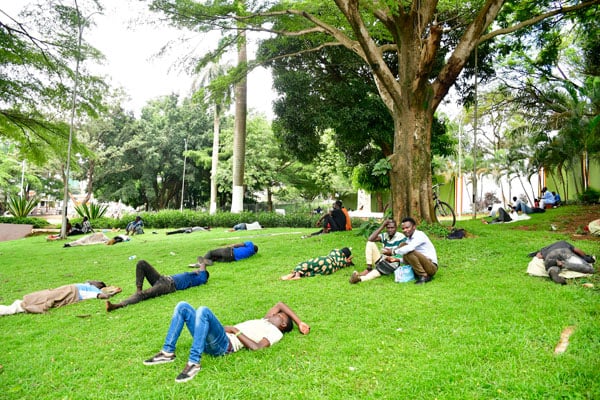Prime
Economy to grow at 5% in 2023, says World Bank

State minister for Trade Harriet Ntabazi (left) and World Bank Country Manager Mukami Kariuki (centre) during the released of a World Bank report in Kampala on December 15, 2022. PHOTO/ COURTESY
What you need to know:
- The report warned that the continued growing public debt, while still sustainable, now requires the government to tread with caution. “The government’s fiscal strategy should rationalise expenditures to create adequate space for priority spending while continuing to rebalance expenditures away from hard infrastructure and towards investment in human capital,’’ the report indicates.
A new report by the World Bank indicates that Uganda’s economy is expected to grow at 5.5 percent during the 2022/2023 Financial Year, up from 4.7 percent in the previous financial year.
The projection is contained in the 20th edition of the Uganda Economic Update by the World Bank which was released in Kampala yesterday.
The updates indicate that the economy is expected to reach 6 percent by 2024.
Uganda’s economy was battered by the two-year pandemic and lockdown measures, cutting growth by half in the Financial Year 2021.
The recovery, according to the report, started at the beginning of the year after the lifting of Covid-19 containment measures and accelerated throughout 2022, boosted largely by a strong performance of the services and industrial sectors, buoyant private consumption, and an uptick in private investment.
Infrastructure construction and heavy investment in oil production are expected to accelerate growth.
“Accelerated growth may reduce the poverty rate slightly to 41.9 percent by 2024, though this will depend on how circumstances evolve,” the report states.
Inflation is projected to drop to between five and seven percent by the end of the current financial year, down from 10.7 percent in October.
Ms Mukami Kariuki, the World Bank country manager, said the economy has remained resilient despite the effects of the pandemic.
“Now, to generate enough jobs for one of the fastest growing populations in the world, accelerate growth in incomes and lift its population out of poverty, the Ugandan economy will need to grow even more rapidly, sustainably, and broadly. Strengthening regional trade and international trade is one of the ways to go,” she said.
Challenges
Ms Sashana Whyte, a senior economist at the World Bank, warned that the recent Ebola outbreak, if not contained, could negate the projected growth, especially by triggering travel bans and lockdowns.
The report further states that a resurgence of Covid-19 remains a threat, especially with the low vaccination rates. President Museveni recently announced a vaccine mandate, to avert a resurgence.
Such, and other infectious diseases, the bank warns, will have an impact on sectors such as tourism that analysts project may not return to pre-pandemic levels until 2024.
Other challenges that place the hopeful growth in a delicate balance include slower global growth projected at 3 percent, high commodity prices, disruptions to global supply chains, tighter global financial markets and policy uncertainty, and climate change.
Dr Elizabeth Kasekende, a research economist at the Bank of Uganda, said the effects will only be medium-term, and they are focused at keeping inflation low and sustainable growth.
To ensure sustainable growth and development, the government has been urged to prepare to tap into the benefits of the Africa Continental Free Trade Area (AfCFTA) agreement
Under the theme “unlocking the benefits of the AfCFTA and regional integration,” Ms Mukami said it is crucial for the country to diversify her international trade and lessen dependence on single trading partners.
Ms Whyte said Uganda stands to increase its growth by 3.3 percent, create 1.7 percent of the annual required jobs, and increase its exports by $2.5b by 2035 if it leverages the agreement.
“Uganda will need to implement some policy benefits, including reducing tariffs, simplifying customs procedures and boosting agriculture productivity, and ensuring the international quality of products meant for export,” she said.
The economist further warned that political developments such as border closures and insecurity could undermine the agreement if not addressed.
But Ms Jane Nalunga, the executive director of SEATIN Uganda, advised the country to specialise in its strong products for competitive advantage.
The Minister of Trade, Ms Harriet Ntabazi, said the agreement will enable Africa to negotiate as a continent, as opposed to individual countries.
Mr Emmanuel Mutahunga, the commissioner of External Trade at the Ministry of Trade, called for increased funding to the ministry, saying if not funded, the agreement will remain on paper.
When fully ratified, the AfCFTA will be the largest free trade area in the world, encompassing 55 countries, 1.3 billion people, and $3.4 trillion in economic output.




